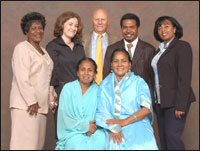
The winners: (clockwise from left) Eugene-Richard, Kochladze, Goldman (cofounder of the prize), De Carvalho, Grueso, Bee, and Shukla.
Photo: Goldman Environmental Prize.
The environmental movement often runs on the adrenaline of outrage, and the past year has provided more outrages than most. The White House has taken aim — and fired — at some of our most powerful environmental laws. Multinational corporations continue to exert undue influence on, and in some cases write, regulations meant to govern them. There are new signs that humans are changing the global climate, and that species are vanishing — perhaps even faster than we had thought. Environmental groups large and small are in full battle mode: Join us! Stop the assault!
But for the long haul, environmentalists need more than outrage. They need hope — a kind of unflappable, adamantine hope. That’s what sustains the winners of this year’s Goldman Environmental Prize. These seven grassroots environmentalists come from across the planet — Africa, Asia, Europe, North America, South and Central America, and island nations — and this year of terrible news hasn’t shaken their faith. After all, most have persisted through far worse: In their long battles for environmental protection and justice, these men and women have been publicly humiliated, jailed, and forced into hiding. They’ve faced corrupt governments, foreign occupation, and decades of civil war. Colombian activist Libia Grueso has lost colleagues to paramilitary assassins. “If some of us have to die, that means that some of us have to continue,” she says. “We make every effort in every instance to be happy, despite the things that occur.”
The Goldman Environmental Prize recognizes the perseverance — and the very concrete accomplishments — of grassroots activists throughout the world. The prize is considered by many to be environmentalism’s highest honor, established in 1990 by Richard and Rhoda Goldman (Richard Goldman founded Goldman Insurance Services in San Franciso, and Rhoda Goldman was a descendant of jeans-maker Levi Strauss). Winners are nominated annually by environmental organizations, and chosen by a panel of former prizewinners and other activists. Each winner or team of winners receives a no-strings-attached award of $125,000. This year’s crop will be honored in a ceremony in San Francisco on April 19.
In this Grist special series, we talk to the 2004 Goldman winners about their victories and defeats, their plans for the future, and their mystifying, inspiring optimism.
- Rashida Bee and Champa Devi Shukla of Bhopal, India, survived the 1984 Union Carbide gas leak that killed 20,000 people. They’re now leading an international campaign to hold Dow Chemical and its subsidiary Union Carbide responsible for the horrifying human cost of the disaster.
- Margie Eugene-Richard of Norco, La., took on an oil refinery and a Shell Chemicals plant that polluted her neighborhood and poisoned her family and friends. Guess what? She won.
- Rudolf Amenga-Etego, a public-interest attorney from Ghana, has mobilized his fellow Ghanaians to demand clean and affordable drinking water. Most recently, he helped derail a major World Bank water-privatization project.
- Demetrio do Amaral de Carvalho of East Timor helped win independence for his Southeast Asian country; now, he’s leading its very first environmental organization.
- Libia Grueso Castelblanco of Colombia has defended the rights of Afro-Colombians — and the integrity of her country’s biologically rich coastal rainforest — in the face of industrial development and the fallout of civil war.
- Manana Kochladze, a scientist and activist from the Republic of Georgia, is working to protect the Georgian people and environment from a $3 billion BP pipeline project.


